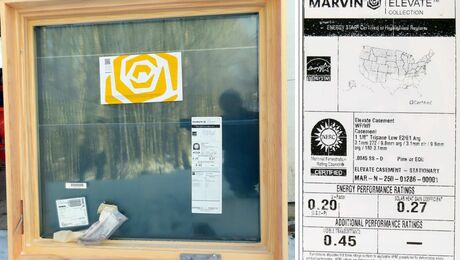What experience has anyone had with MLI (Multi Layered Insulation) in attics?
DaveDish
| Posted in General Questions on
Specific product by Yellow Blue. Also their solar fan for attics
GBA Detail Library
A collection of one thousand construction details organized by climate and house part
Search and download construction details









Replies
Are referring to radiant barriers. If so, read Martin's article on "a solution in search of a problem."
https://www.greenbuildingadvisor.com/blogs/dept/musings/radiant-barriers-solution-search-problem
Also check out "fans in the attic."
https://www.greenbuildingadvisor.com/blogs/dept/musings/fans-attic-do-they-help-or-do-they-hurt
It looks like you are referring to products described on this web page: Multi-layer insulation.
These products have a very low R-value and cost more than conventional insulation products with a higher R-value. Avoid them.
You should check out the two links that Steve provided if you want more information on radiant barriers and powered attic fans. Here is the short version: Avoid these products.
-- Martin Holladay
I took a look at the web page, and their sales pitch is highly misleading. The design of the product doesn't make sense, and I saw no performance data at all. And, as if they want to make sure that visitors to their web site know that they are scammers selling bogus products, they also offer "insulating paint" which is well known to be essentially useless. They might as well have a section for "bridges New York" and another for unclaimed fortunes from deceased princes.
Did you receive any feedback on the MLI ?
I just heard about this and I'm curious too.
HullA,
DaveDish received three responses y0u can read above. Fair to say they weren't encouraging.
'Multi-layer insulation is not science fiction, it's a real product used in spacecraft!' is the sentiment they want you to leave with.
In actuality, these things work really really well in vacuum. They're what you do in space, to get extremely slow but continuous thermal transmissions, down >90% into a region where you can fix the balance with solar panels. They're much, much more effective than things like styrofoam in a vacuum.
By the time you get to Mars pressure, they're several orders of magnitude less effective. It's difficult to imagine insulating something like liquid oxygen on Mars passively for the duration of a mission.
On Earth, they're several orders of magnitude less effective than that.
Nearly all thermal transmission on Earth of normal room-temp materials (300K) without an unobstructed view of the Sun (6000K), or the clear night sky (3K), is conductive or convective in nature. At normal temperatures, things just don't radiate much heat; At normal temperature differences (298K vs 302K in different parts of the room), nearly all of that is radiated right back in equal measure.
You can fall into a trap where you try to test them using IR cameras. This is a poor comparison, because the IR camera results are only valid for surfaces with an emissivity close to 1 (or whatever the camera is normed for). A thermally reflective surface may 'fool' the IR camera into representing dramatic differences, without actually being significantly different than a thermally opaque surface, if convection/conduction dominate.
On top of that, an aluminum foil layer with some thick dust on it works approximately the same as a paper layer with some thick dust on it, from a radiative thermal standpoint. These things need to be perfectly clean for even the tiny effect that they can claim.